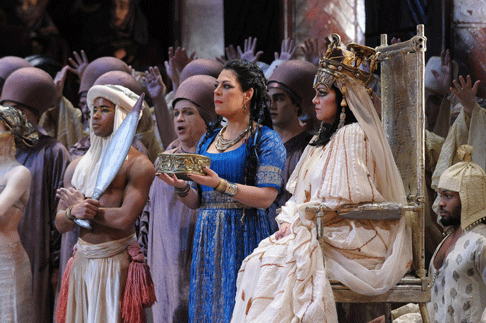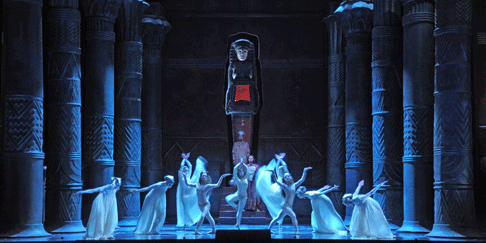![Sondra Radvanovsky as Aida and Marcello Giordani as Radames [Photo: Dan Rest/Lyric Opera of Chicago]](http://www.operatoday.com/Aida_Chicago_22.gif)
17 Feb 2012
Verdi’s Aida at Lyric Opera, Chicago
In its current revival of Giuseppe Verdi’s Aida Lyric Opera of Chicago approaches the challenges of the ambitious score with a cast well suited to the music and to the drama.
English Touring Opera are delighted to announce a season of lyric monodramas to tour nationally from October to December. The season features music for solo singer and piano by Argento, Britten, Tippett and Shostakovich with a bold and inventive approach to making opera during social distancing.
This tenth of ten Live from London concerts was in fact a recorded live performance from California. It was no less enjoyable for that, and it was also uplifting to learn that this wasn’t in fact the ‘last’ LfL event that we will be able to enjoy, courtesy of VOCES8 and their fellow vocal ensembles (more below …).
Ever since Wigmore Hall announced their superb series of autumn concerts, all streamed live and available free of charge, I’d been looking forward to this song recital by Ian Bostridge and Imogen Cooper.
Although Stile Antico’s programme article for their Live from London recital introduced their selection from the many treasures of the English Renaissance in the context of the theological debates and upheavals of the Tudor and Elizabethan years, their performance was more evocative of private chamber music than of public liturgy.
Evidently, face masks don’t stifle appreciative “Bravo!”s. And, reducing audience numbers doesn’t lower the volume of such acclamations. For, the audience at Wigmore Hall gave soprano Elizabeth Llewellyn and pianist Simon Lepper a greatly deserved warm reception and hearty response following this lunchtime recital of late-Romantic song.
For this week’s Live from London vocal recital we moved from the home of VOCES8, St Anne and St Agnes in the City of London, to Kings Place, where The Sixteen - who have been associate artists at the venue for some time - presented a programme of music and words bound together by the theme of ‘reflection’.
'Such is your divine Disposation that both you excellently understand, and royally entertaine the Exercise of Musicke.’
‘And there was war in heaven: Michael and his angels fought against the dragon; and the dragon fought and his angels, And prevailed not; neither was their place found any more in heaven … that old serpent … Satan, which deceiveth the whole world: he was cast out into the earth, and his angels were cast out with him.’
There was never any doubt that the fifth of the twelve Met Stars Live in Concert broadcasts was going to be a palpably intense and vivid event, as well as a musically stunning and theatrically enervating experience.
‘Love’ was the theme for this Live from London performance by Apollo5. Given the complexity and diversity of that human emotion, and Apollo5’s reputation for versatility and diverse repertoire, ranging from Renaissance choral music to jazz, from contemporary classical works to popular song, it was no surprise that their programme spanned 500 years and several musical styles.
The Academy of St Martin in the Fields have titled their autumn series of eight concerts - which are taking place at 5pm and 7.30pm on two Saturdays each month at their home venue in Trafalgar Square, and being filmed for streaming the following Thursday - ‘re:connect’.
The London Symphony Orchestra opened their Autumn 2020 season with a homage to Oliver Knussen, who died at the age of 66 in July 2018. The programme traced a national musical lineage through the twentieth century, from Britten to Knussen, on to Mark-Anthony Turnage, and entwining the LSO and Rattle too.
With the Live from London digital vocal festival entering the second half of the series, the festival’s host, VOCES8, returned to their home at St Annes and St Agnes in the City of London to present a sequence of ‘Choral Dances’ - vocal music inspired by dance, embracing diverse genres from the Renaissance madrigal to swing jazz.
Just a few unison string wriggles from the opening of Mozart’s overture to Le nozze di Figaro are enough to make any opera-lover perch on the edge of their seat, in excited anticipation of the drama in music to come, so there could be no other curtain-raiser for this Gala Concert at the Royal Opera House, the latest instalment from ‘their House’ to ‘our houses’.
"Before the ending of the day, creator of all things, we pray that, with your accustomed mercy, you may watch over us."
The doors at The Metropolitan Opera will not open to live audiences until 2021 at the earliest, and the likelihood of normal operatic life resuming in cities around the world looks but a distant dream at present. But, while we may not be invited from our homes into the opera house for some time yet, with its free daily screenings of past productions and its pay-per-view Met Stars Live in Concert series, the Met continues to bring opera into our homes.
Music-making at this year’s Grange Festival Opera may have fallen silent in June and July, but the country house and extensive grounds of The Grange provided an ideal setting for a weekend of twelve specially conceived ‘promenade’ performances encompassing music and dance.
There’s a “slide of harmony” and “all the bones leave your body at that moment and you collapse to the floor, it’s so extraordinary.”
“Music for a while, shall all your cares beguile.”
The hum of bees rising from myriad scented blooms; gentle strains of birdsong; the cheerful chatter of picnickers beside a still lake; decorous thwacks of leather on willow; song and music floating through the warm evening air.
![Sondra Radvanovsky as Aida and Marcello Giordani as Radames [Photo: Dan Rest/Lyric Opera of Chicago]](http://www.operatoday.com/Aida_Chicago_22.gif)
In its current revival of Giuseppe Verdi’s Aida Lyric Opera of Chicago approaches the challenges of the ambitious score with a cast well suited to the music and to the drama.
Under the direction of conductor Renato Palumbo the Ethiopian slave Aida is sung by Sondra Radvanovsky, Amneris by Jill Grove, Radames by Marcello Giordani, Ramfis by Raymond Aceto, Amonasro by Gordon Hawkins, and the King by Evan Boyer. At the start of the overture Palumbo emphasized soft, legato playing among the strings with the cellos standing out in gradual contrast. In the middle segment of the overture familiar melodies associated later with specific characters and scenes were etched out with clarity and crisp playing. A return to piano delicacy rounded out the overture fittingly under Palumbo’s direction.
In Act One soon after the announcement by the priest Ramfis that direction will be given to the Egyptian army the first scene of divided loyalties features the officer Radames. Torn between his military ambitions and his love for the slave Aida, Radames gives vent to his emotions in the celebrated aria, “Celeste Aida.” Mr. Giordani sings here with an open, clarion approach, the top notes taken forte and with full confidence. In contrast, his final thoughts of the beloved are sung with an effective diminuendo. Mr. Giordani’s conception of the role and the complexities of character deepen as he proceeds into the following acts, so that softer modulations evident later appropriately enhance the initial impression given here. At the subsequent appearance of Amneris, daughter of the Egyptian king, Ms. Grove struck a challenging figure by infusing an Italianate sense of line with extremely effective low pitches. Her duet with Radames was occasionally overshadowed by the orchestra, yet Ms. Grove’s thrilling and secure top notes left her emotional ambitions for Radames clearly dominant.
At the entrance of Aida the musical scene develops into a trio in which Ms. Radvanovsky’s skillful piano singing suggested gradually oppositional relationships. Such a conflict is intensified in the following two scenes, first in the presence of the King and second in the temple of Vulcan. When the King, sung with well-controlled declamation by Mr. Boyer, announces Radames as the chosen leader to thwart the Ethiopian invasion, the soloists and chorus declare their enthusiasm. In response to the choral cries of “Ritorna vincitor!,” Aida sings her celebrated aria of the same line with intersecting thoughts on homeland and love. Here Radvanovsky’s middle range was especially well deployed with touching diminuendo and a beautifully produced final note on “soffrir.” In the final scene of this act located in the temple politics and religion focus again on the forthcoming battles and prayers for the victory of Radames and his troops. The choral exposition was here appropriately emphatic. As Ramfis the high priest invested Radames with the ceremonial sword, both Aceto and Giordani expressed their devotion with a noteworthy sense of legato.
 Sondra Radvanovsky as Aida and Jill Grove as Amneris
Sondra Radvanovsky as Aida and Jill Grove as Amneris
In the first scene of Act Two Amneris discovers indeed the secret of Aida’s love for Radames. In their duet Grove and Radvanovsky were dramatically convincing in their exciting duet “Fu la sorte.” Grove’s powerful notes on “Trema!” after confirming the truth expressed her determination to exact revenge. In response, Radvanovsky’s touching pleas on “Numi, pieta” drifted into the air but remained unheeded. As the outcome of the battles dominates the start of the next scene, Ethiopian prisoners are brought in after a parade led by the victorious Radames. A ballet conducted in honor of the King was especially well performed. The vocal ensemble with, on one side, Aida and her father Amonasro as an Ethiopian prisoner, on the other, Amneris, the King, and Radames was well staged and seamlessly conducted. The act ended with Grove’s triumphant declarations in response to the King giving her hand in marriage to Radames.
The single scene of Act Three of Aida on the banks of the Nile has often been emphasized for its dramatic and vocal significance. In this production the realistic atmosphere in the scene was introduced by a boat seeming to glide along the river. After Ramfis utters a prayer for Amneris and her marriage in the temple, Aida sings her romanza, “O patria mia,” surely a highlight of these performances. Radvanovsky assumes a bel canto line in her approach to the aria with exquisite high notes taken on “mai piu” and at its conclusion. In the following duet with her father Amonasro (“Ciel, mio padre”) both Radvanovsky and Hawkins show strong emotional commitment communicated through vocal line and use of rubato. During her impassioned exchange with Radames, Aida finally convinces her lover to flee (“Fuggiam”). The floating piano notes at the end of the duet belie the violent ending of the act when Radames is taken prisoner after the accusation of Amneris.
 Scene from Aida
Scene from Aida
The final act of Aida places Radames in both scenes with the two women vying for his affections strategically divided. At first Amneris attempts to regain control by convincing Radames that she agrees to his defense before the judges. Grove’s transition from hushed notes to a dramatic top gives the impression of unhinged emotions. This heightened tension is enhanced during her duet with Radames. Once he refuses the intervention of Amneris, he also abandons himself to the tribunal. In response to his sentence of death Grove hurls a final dramatic curse at the judges with blood-chilling fury. In the final scene of Act Four Aida joins her beloved in the tomb to die at his side. Radvanovsky and Giordani sang their final duet, “O terra, addio,” with a renewed freshness as though their love formed a bridge to another world. As they sang their final notes in piano unison, Grove’s chants of “Pace” put a seal on their earthly life.
Salvatore Calomino